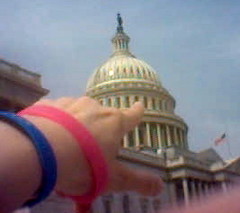"The Conscience of the Holocaust" Has Died
 This is a very sad day. Rather than try to find the words, I will instead post this alert I received from his organization:
This is a very sad day. Rather than try to find the words, I will instead post this alert I received from his organization:Simon Wiesenthal, the famous Nazi Hunter, has died in Vienna at the age of 96.
Said Rabbi Marvin Hier, dean and founder of the International Human Rights NGO named in Mr. Wiesenthal’s honor:
"Simon Wiesenthal was the conscience of the Holocaust.
When the Holocaust ended in 1945 and the whole world went home to forget, he alone remained behind to remember. He did not forget.
He became the permanent representative of the victims, determined to bring the perpetrators of the history’s greatest crime to justice. There was no press conference, and no president, prime minister, or world leader announced his appointment. He just took the job. It was a job no one else wanted.
The task was overwhelming. The cause had few friends. The Allies were already focused on the Cold War, the survivors were rebuilding their shattered lives and Simon Wiesenthal was all alone, combining the role of both prosecutor and detective at the same time.
Overcoming the world’s indifference and apathy, Simon Wiesenthal helped bring over 1,100 Nazi War Criminals before the bar of Justice."
Click here to help them continue their good work.







10 Comments:
My friend, Sahbra, who survived the Holocaust (my post about her is in the right sidebar), asked me to post a comment for her:
"I am also very sad! When no one else wanted to remember, he was still hunting the criminals!
1,100 were brought to justice! I will never forget his work and dedication. He did it for us all!"
Baruch Dayan Haemet.
This comment has been removed by a blog administrator.
Thought you all might like to read Dianne Feinstein's tribute:
Mrs. FEINSTEIN: Mr. President, I rise today to pay tribute to a man who dedicated himself to preserving the memory of the millions who perished in the Holocaust and to promoting human rights and preventing genocide.
Simon Wiesenthal lived through unimaginable tragedy and horror as a prisoner in Nazi concentration camps during World War II. He survived the Holocaust and spent the next 60 years of his life tracking down the war criminals who had perpetrated terrible atrocities.
During the course of World War II, Simon Wiesenthal spent four years in a series of 12 concentration camps. He was a prisoner in the Mauthausen camp when it was liberated by the United States Army on May 5, 1945.
Col. Richard Seibel who led the troops in liberating the camp described the horror that they found in a report to his superiors: “Mauthausen did exist. Man’s inhumanity to man did exist. The world must not be allowed to forget the depths to which mankind can sink, lest it should happen again.”
Mr. Wiesenthal and his wife Cyla had been separated by the war, but were reunited shortly after it ended. Between the two of them, 89 family members were killed.
They decided to start a family of their own and in 1946 had a daughter, Paulinka, who went on to have children and grandchildren of her own.
Also following the war, Mr. Wiesenthal went to work for the War Crimes Office run by the Americans. This was just the start to a life-long mission to bring Nazi war criminals to justice.
He opened his own Historical Documentation Center to collect information on war criminals that was used to search them out and prosecute them for their heinous crimes. The evidence collected at the documentation center was used in prosecutions at the International Military Tribunal in Nuremberg in 1945 and 1946.
Credited with hunting down 1,100 major and minor Nazi war criminals since the end of World War II, Mr. Wiesenthal is most renowned for his role in the capture of Adolf Eichmann. Eichmann engineered Adolf Hitler’s “Final Solution of the Jewish Problem” that led to the extermination of six million Jews as well as millions of non-Jews.
Eichmann was captured by Israeli agents in Argentina in 1960. Observed at trial in 1961, Mr. Wiesenthal later described his impression of Eichmann: “In my mind I had built up the image of a demonic superman. Instead I saw a frail, nondescript, shabby fellow in a glass cell between two Israeli policement; they looked more colorful and interesting than he did. There was nothing demonic about him; he looked like a bookkeeper who was afraid to ask for a raise.”
I am privileged to say that I did personally know Simon Wiesenthal. I received him in my home to raise money for the Wiesenthal Center in Los Angeles. I also met with him in Vienna where I saw his small, cramped office and voluminous files.
He was one of the most amazing people; he stayed the course, never gave up, and was the greatest Nazi hunter of our time.
Dedicated in 1977 to all of the 11 million people of different nationalities, races and creeds who died in the Holocaust, the Simon Wiesenthal Center in Los Angeles promotes tolerance and understanding through community involvement, educational outreach and social action, and confronts important issues such as racism, anti-Semitism, terrorism and genocide.
The Center’s founder and dean, Rabbi Marvin Hier said the following about Simon Wiesenthal’s legacy, “I think he’ll be remembered as the conscience of the Holocaust. In a way he became the permanent representative of the victims of the Holocaust, determined to bring the perpetrators of the greatest crime to justice.”
We have lost a leading voice for raising awareness and understanding of the Holocaust. It is imperative that his legacy and dedication to the millions who were killed because of their religion, race or nationality be remembered. We must do all that we can to ensure that human atrocities like this never happen again.
Let me conclude with Mr. Wiesenthal’s own words, “When history looks back, I want people to know that the Nazis weren’t able to kill millions of people and get away with it…If we pardon this genocide, it will be repeated, and not only on Jews. If we don’t learn this lesson, then millions died for nothing.”
Thank you, Mr. President.
Wiesenthal: If we don’t learn this lesson, then millions died for nothing.
May we learn the lesson!
What a man he was.
A true hero.
:( BDE
His life was a true victory.
For Jews, for lovers of justice, for true human beings everywhere.
He did not forget, just as we will not.
What's amazing is that he could face the horrors that he did and continue to strive for justice.
Iris Chang, who wrote the Rape of Nanking, recently committed suicide while researching another book. The nastiness of world war II can never be understated.
Post a Comment
<< Home